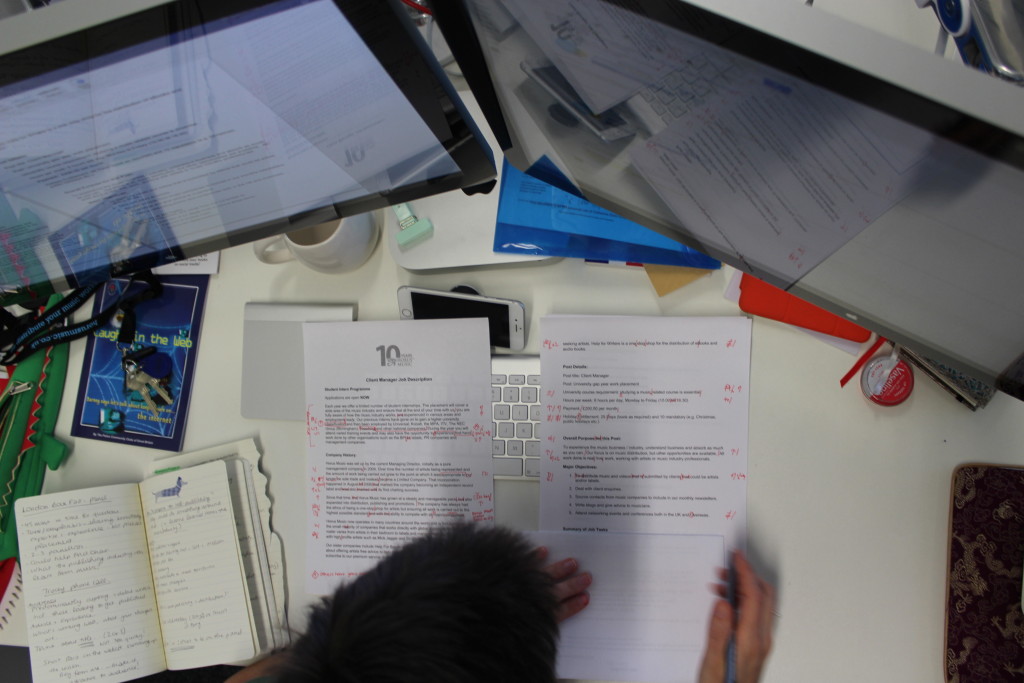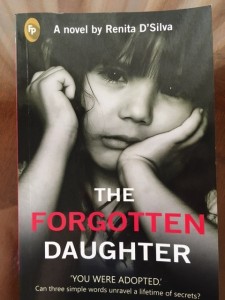I’ve been caught in the act of actually working! I’m considering taking up a career as a model now…
Month: March 2016
On 5 March I went to the Writing East Midlands conference. I came away feeling as though I’m equipped with all the skills to be a successful writer … except writing skills!
I learned about self-promotion, working with an editor, creating a web presence, and writing crime fiction. I’ll be sharing my pearls of wisdom in bite-size chunks (to mix my metaphors!) over at Help For Writers during the next few weeks, so I can’t give everything away here. I can give you a few tasters, though.
It was a blast from the past to visit Loughborough University, as I graduated from there in 2001. I was based in the art department on the other side of the road, but I visited the Martin Hall building for my ‘Music & the Visual Arts’ module and it was good to see the old alma mater again!
The opening keynote was delivered with energy and enthusiasm by Mike Gayle, who made us all laugh and root for him as he told us the story of how he got where he is today.
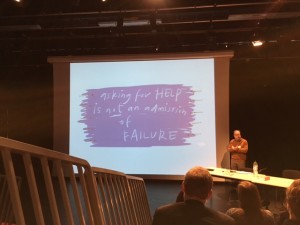
Pete Mosley on The Art of Shouting Quietly
Pete is a business coach for creatives, and his workshop on self-promotion for introverts was full of quotable gems like: “Embrace your non-conformity”, “creative people fuel the world”, and “asking for help is not an admission of failure”. I may have been a little bit biased because I loved his illustrated slides – like me, he studied Fine Art at university – but he came across as a thoroughly nice person.
Top three take-home points:
- Define what success means to you
- Move out of your comfort zone
- Do your market research
Cressida Downing on Working With an Editor
Cressida (a.k.a. The Book Analyst) specialises in deep structural editing and clearly knows her stuff. “The point of editing is to get you a beautiful book” – can’t say fairer than that! She gave a good explanation of the difference between a ‘read and review’, a deep structural edit, copy-editing, and proofreading. Lots of people think they need the last two when they actually need the first two. I try to be clear that I only offer copy-editing and proofreading – structural editing is a different thing and needs a different set of skills. Cressida was the source of the day’s most inspiring quotation: “You never get worse at writing.”
Top three take-home points:
- Don’t edit as you go along. Get to the end first
- Make sure your editor works in your genre
- Editors charge by length, so cut your manuscript as much as you can before sending it off
Shreya Sen Handley, Dan Simpson & Alice Graham on Shouting Loudly: Creating a Presence on the Web
Considering the discussion was pitched around ‘shouting loudly’, there were a lot of mentions of not shouting! There was a general consensus that you need to listen, reciprocate and participate in online communities, not just shout or blow your own trumpet.
Top three take-home points:
- Do one or two things well; don’t try to do everything
- Avoid sharing the same content on multiple platforms (guilty as charged!)
- If you blog, end your posts with a question to encourage comments
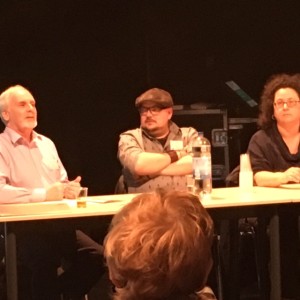
Stephen Booth, Sophie Hannah & David Mark on Writing Crime Fiction
After this and the closing keynote by Sophie Hannah I’m a bit of a fan, and I haven’t even read one of her books yet! I did buy her collection of short stories, which I got signed – and the next day I discovered that I’d already bought The Narrow Bed on Kindle! Her descriptions of her plots made them sound right up my street. I love a good psychological thriller.
What struck me most about this discussion was that all three participants started writing at a really early age. Stephen finished his first novel at the age of twelve! Their different approaches to location were interesting too – it was crucial to David, who’s novels are based around Hull (even those which aren’t set there!), whereas Sophie uses fictional settings as “human beings are the same everywhere.”
Top three take-home points:
- Getting a huge advance can be a poisoned chalice if your book doesn’t sell well enough
- Avoid being too self-critical and enjoy your successes when they come
- “The only thing you can control is how good you can make the book” – Sophie Hannah
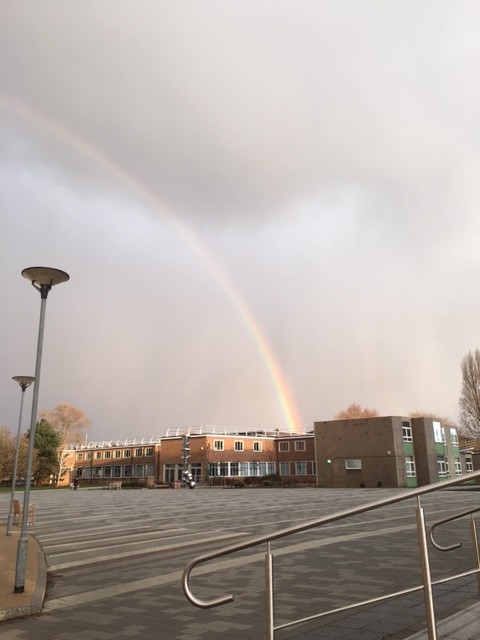
Imagine a proofreader at work. What are they working on? Most people would picture them working on a novel. Perhaps, if you write non-fiction books, you might be imagining them with their nose in a history manuscript, a biography or a recipe book. Very few people would envisage someone proofreading a website. But your website is your ‘shop window’ to the world, and it’s vital to get it right and show yourself – and your business – to its best advantage.
I do a lot of website proofreading, copy-editing and even copy-writing, and it gives me a huge amount of satisfaction to give a site the final polish that sets it apart from its competitors.
If you run a small or medium sized business, its particularly important to pay close attention to your website and invest in making it as good as possible. If your potential client has to choose between you and your main competitor, the professionalism of your website will influence them. If your website is peppered with spelling mistakes and your rival’s isn’t… well, it makes you look bad. Unfairly so, because less-than-perfect spelling doesn’t mean you can’t do your job. (Don’t get me on my soapbox about people who get all Judgey McJudgeypants over spelling and grammar! That’s a blog post for another day.)
If you’re an author, it’s essential to make sure your website copy is perfect. Although writers work with words, I’m a big believer in the principle that a writer’s strength is their imagination. Not all writers can spell, but they can create characters and worlds. I can spell like a… like a dictionary, but that’s just the grunt work; it doesn’t mean I can write a novel! (Disclaimer: I’ve never tried, but I strongly suspect it would be rubbish.)
If you’re a self-published author, your website is one of the most important tools to sell your books and you don’t have a publishing company looking over your shoulder and polishing the copy. I strongly recommend that you invest in a website ‘proof-edit’ to make sure your unique voice comes across as strongly as possible.
Not everyone who advertises proofreading or editing services works on websites. It’s a different skill from proofreading a leaflet, article or book. I’ve been proofreading and editing websites for twelve years and writing web copy for six years. If you’d like a fresh pair of eyes looking at your site, don’t hesitate to get in touch. It’s a small investment that could pay off big time if it helps you land that crucial new client.
I chose this book from the Om Bookshop in Phoenix Mall, Mumbai, because after visiting India twice recently I’m keen to discover lesser-known contemporary novelists writing about the country.
The story starts with Nisha, a young British-Indian woman, shortly after her parents’ unexpected death. She has always lived in England and feels no connection to India, never having visited – as far as she knew. But the discovery that she was adopted from a Catholic convent near Mangalore sends her on a journey, both physical and emotional, to find out more about her early childhood.
There are three main characters – Nisha, Shilpa and Devi – and we gradually find out how they are connected as we follow Nisha in her efforts to find her biological parents.
After such a short time in India I’m still not fully au fait with koilolis, idlis or chicken sukka, but I can certainly appreciate D’Silva’s rich, multi-sensual picture of life in a small Indian village. She uses food, colours and aromas to paint vivid images in the mind’s eye with great skill. She also does an excellent job of showing us three key characters with quite different personalities. They all face challenges relating to love and relationships; they all have experiences of motherhood to convey from the perspective of mother, daughter or both.
Sometimes Nisha’s lines of dialogue can seem a little stilted – which British person would say “It would have been different had they been writing a scientific paper” instead of “… if they’d been writing a scientific paper”, for example, and who talks out loud about “The vivid smells which accost my nose”? – but those few moments are quickly forgotten in the sweep of the story.
D’Silva brings all the threads together with perfect timing, keeping the reader guessing for just long enough before showing us how the next piece of the puzzle fits in. The plot never gets confusing yet it’s not too predictable either. My only criticism is that the ending doesn’t quite work for me – it seems a little too symmetrical, if I was going to be very fussy – but I strongly suspect that might just be a personal thing!
My verdict: if you want a taste of India, either as a reminder or a new experience, you can’t do much better than this. Don’t be put off if you’re not into ‘motherhood’ as a theme. This book is about love, loss, difficult decisions, personal growth and what people are capable of – themes that can resonate with anyone. Four stars out of five.
